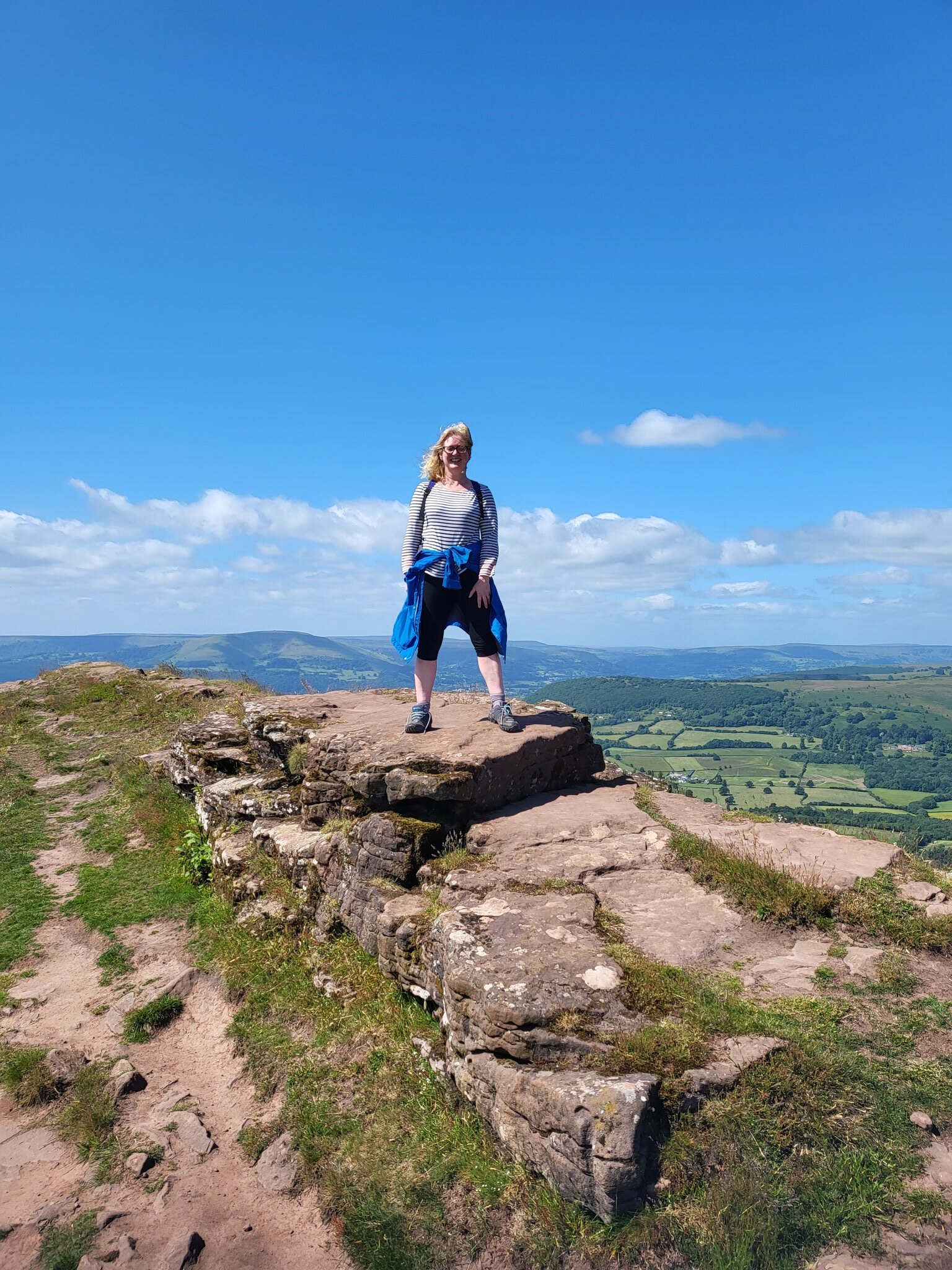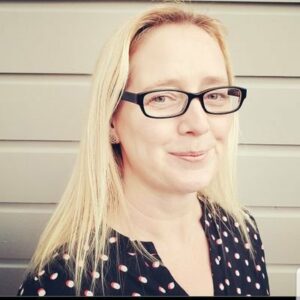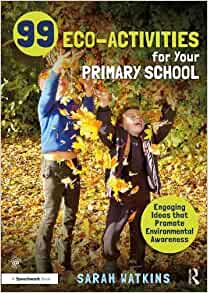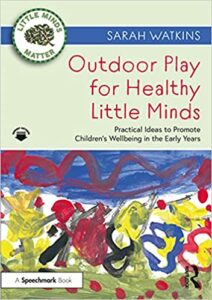
JULIA LEE BARCLAY-MORTON – YOGA, WATER AND REWRITING AUTISM
I interviewed writer Julia Lee Barclay-Morton about her experience of autism. Julia began as an experimental dramatist in New York, moving to the UK to


I interviewed author and eco-educationalist Sarah Watkins, who has been a Forest School leader and head teacher, and now lectures and writes books about young children playing outdoors for wellbeing.
Leslie: Can you describe your childhood and how it has informed your teaching ethos. What made it possible for you to play so freely outdoor without risk?
Sarah: My childhood was characterised by free play, unfettered by the culture of fear that Frank Furedi talks about. (This is the idea that people can be made fearful by those in authority using emotional bias to achieve political or workplace goals. So, through tabloids and social media, people are told what to fear and the pervading message is that the environment outside the home is extremely dangerous). I was born in London in the 70’s and then my parents took the bold decision to move to a remote village on the Welsh borders. Some of the locals weren’t sure what to make of my parents. (I remember a child hitting me in the face and shouting “Your dad’s a hippy!”) However, we were mainly welcomed and my sisters and I enjoyed being outside as much as possible (we didn’t own a TV). At this time, it was not unusual for children to lead a Famous Five-type existence and no one remarked on children playing outside without adult supervision. I have vivid memories of stretching out over a pond to reach a stick, hiding in long grass, whittling sticks, flying down hills on my bike. I suppose we were well-known by all the villagers but my husband, who grew up in an urban area, had the same level of independence. There was risk but we were taught to evaluate it and make informed decisions. My mum was a teacher and my dad was a writer and, through their discussions with us, they encouraged us to think critically and consider how best to deal with hazards such as nettles and brambles.
When I entered the teaching profession, I was also a trained Forest School leader and a strong part of my teaching ethos has always been centred around the importance of children being outside as much as possible and being supported to assess risks for themselves. I think carefully about why rules are in place and talk them through with children.
Leslie: Can you describe your pre-teaching project work and the unheard voices you platformed. What were the key elements that made it possible to uplift those people?
I worked for The Rural Media Company, a charity with decades of experience of telling powerful stories from unheard voices, nurturing new creative talent and influencing change. One of the projects I worked on was a play consultation in Kidderminster. The local authority were finding that new play areas were continually destroyed and wanted us to consult local children and young people. On our first evening there, my colleague and I met the local youth workers in the youth centre, a flat-roofed building in the centre of a run-down housing estate. Suddenly there was a loud banging and scrabbling in the darkness. A few minutes later, we heard a steady drumming above our heads that became almost deafening. The hairs on the back of my neck stood up. Then, after about ten minutes, the noise abruptly stopped. One of the youth workers turned to us and said: “they do that sometimes.” The young people drumming their feet on the roof felt ignored and frustrated, and they’d felt like that for years. The work we did could not combat the multiple problems these young people were facing in their lives but it did enable them to talk about how it made them feel and what they needed.
Primarily, the people we worked with wanted someone to listen and be engaged. It was gratifying to be able to showcase skills and talents that project participants already had and to build their capability. Many people taking part had low self esteem and confidence and although these projects made a difference, funders often want to fund short term projects which was frustrating, as you could see the impact but also the further potential for change.

Leslie: As a teacher, how did you structure forest school, eco and family learning? What have you learned from leading on those subjects?
Sarah: Forest School has a distinct ethos where sessions:
All of these aspects promote healthy child development but there can be barriers when you work in a formal education setting. One of the biggest problems is staffing, and this problem was exacerbated during the pandemic. Ideally, a session should have a minimum of two adults to around 15 children but if someone in school is ill, staff need to be moved around. I’m not a Forest School ‘purist’ and I feel there can be value from adult led activities as well as child-led activities but children do need that opportunity to explore the Forest School site without close supervision, deciding on what they want to do and learn. Any form of outdoor learning requires a high level of preparation and resourcing and this can be very time-consuming. However, it offers the opportunity to see children in a completely different context and to enable children to be successful in different ways. Self-determination theory states that to promote good wellbeing, we all need to feel competent, feel connected and experience autonomy. Learning to use tools such as knives, mallets and ropes helps children to see themselves as more capable and sitting round a fire brings a level of connectedness that is hard to replicate. Being outside in a Forest School area enables children to devise their own challenges and test these, without feeling they are under adult surveillance.
Leslie: Being a highly-committed teacher/head who now lectures on the subject can be an all-or-nothing experience. What have been the highs and lows of giving yourself so completely to teaching?
Sarah: Teaching definitely becomes part of your life but the death of a friend and colleague made me see that although teaching is extremely important, it is crucial that we do not become martyrs and sacrifice our whole lives to it. My colleague was, of course, quickly replaced at work but left behind two children. It made me think about my own family and I resolved at that point that I would work hard to ensure that I was there as a mum and wife as well as doing my job as well as possible. It’s almost impossible to stop worrying about certain students at 3am but I have learned that you have to draw a line under lesson planning and resourcing at a certain point and learn to work smarter. The positive side of teaching is that you are making a significant impact and it is extremely rewarding. I currently support trainee teachers and it’s a real privilege to be involved in the early stages of their career.
 Leslie: Tell us the story behind the writing/publishing & promotion of your book Outdoor Play for Healthy Little Minds. How does authorship differ from committed teaching? What did you learn from writing it?
Leslie: Tell us the story behind the writing/publishing & promotion of your book Outdoor Play for Healthy Little Minds. How does authorship differ from committed teaching? What did you learn from writing it?
Sarah: This was all down to the lovely Debbie Garvey, who is an author and Early Years expert/academic. She organised an Early Years BrewEd event in Leeds that I attended and subsequently mentioned that Routledge were looking for authors for a new series on wellbeing and Early Years. I got in touch with the editor and was delighted to hear that one of the topics still available was outdoor play. I found the process of writing a book completely different to teaching, although I was keen that the voices of children ran throughout. One of the key voices within the book is that of ‘Jack’ who is in a looked after situation: “playing is when we choose, not the teacher.” The book ends with a poem from Jack, which is one of my favourite parts. I found the research process fascinating and it was enlightening to speak to experts in the field who sometimes caused me to reconsider my preconceptions. Similarly, I find that working with children and young people often makes me see things from a new perspective.
Sharing messages from the book at conferences and other events is part of that continuing professional discussion that teachers are constantly engaged in – it’s fascinating to learn about different people’s contexts, experiences and approaches.
Leslie: Why do you use the Twitter handle @mini_lebowski, please?
Sarah: I’m a big fan of the Coen brothers but I have to admit that I didn’t put a lot of thought into my Twitter handle! I didn’t really understand Twitter at the start and actually left for a few years! It was funny attending a conference a while ago and hearing someone shout “Lebowski!” at me!
Next week I interview poet Jacqueline Saphra, who was shortlisted for the T.S.Eliot Prize.
ABOUT LESLIE TATE’S BOOKS:

I interviewed writer Julia Lee Barclay-Morton about her experience of autism. Julia began as an experimental dramatist in New York, moving to the UK to

I interviewed Gillean McDougall from Glasgow, who edited the collaborative projects Honest Error (on Charles Rennie Mackintosh and his wife Margaret Macdonald) and Writing the

I interviewed French writer Delphine de Vigan, whose book, No et moi, won the prestigious Prix des libraires. Other books of hers have won a clutch

I interviewed Joanne Limburg whose poetry collection Feminismo was shortlisted for the Forward Prize for Best First Collection; another collection, Paraphernalia, was a Poetry Book Society Recommendation. Joanne

I interviewed Katherine Magnoli about The Adventures of KatGirl, her book about a wheelchair heroine, and Katherine’s journey from low self-esteem into authorial/radio success and
| Cookie | Duration | Description |
|---|---|---|
| cookielawinfo-checkbox-analytics | 11 months | This cookie is set by GDPR Cookie Consent plugin. The cookie is used to store the user consent for the cookies in the category "Analytics". |
| cookielawinfo-checkbox-functional | 11 months | The cookie is set by GDPR cookie consent to record the user consent for the cookies in the category "Functional". |
| cookielawinfo-checkbox-necessary | 11 months | This cookie is set by GDPR Cookie Consent plugin. The cookies is used to store the user consent for the cookies in the category "Necessary". |
| cookielawinfo-checkbox-others | 11 months | This cookie is set by GDPR Cookie Consent plugin. The cookie is used to store the user consent for the cookies in the category "Other. |
| cookielawinfo-checkbox-performance | 11 months | This cookie is set by GDPR Cookie Consent plugin. The cookie is used to store the user consent for the cookies in the category "Performance". |
| viewed_cookie_policy | 11 months | The cookie is set by the GDPR Cookie Consent plugin and is used to store whether or not user has consented to the use of cookies. It does not store any personal data. |